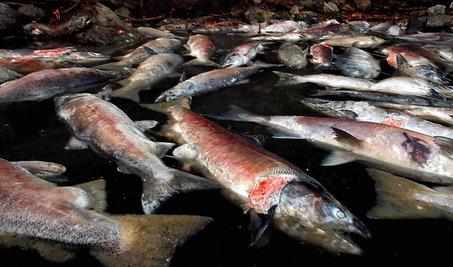The summer of 2002 was a drought year in the Klamath Basin.

An estimated 70,000 salmon died that year after the Bush administration "ignored its own federal biologists and divert more water from the Klamath River for farm irrigation". According to documents, the decision was made because the farmers generally voted Republican. The Bush Administration then went on to order that water continue to be diverted for another eight years.
Only 24,000 fall chinook spawned naturally in the Klamath in 2004, followed by 27,000 last year.
The analysis from the U.S. Fish and Wildlife Service identified low water flows as a prime culprit in a major salmon kill on the Klamath River in 2002.
Because it takes several years for salmon to reach peak reproducing age, the effects of this huge fish-kill only started in 2005 when the National Marine Fisheries Service abbreviated the commercial salmon season. It cut the income of west coast fishermen "by 50 percent".
California and Oregon indian tribes, that have depended on salmon fishing for thousands of years, also had their fishing quotas cut back by as much as half.
It's easy to look at this example as an exception based on petty politics, but that would require you to overlook five centuries of political and economic policy.
When you look around the global environment today you will see nearly every animal species, large and small, in trouble. It doesn't matter if they live on land, water, or air.
Recent comments